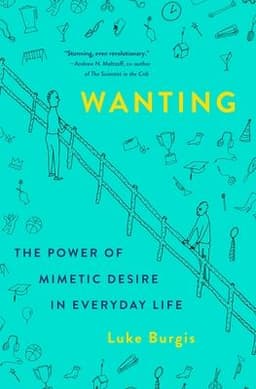
Wanting Book Summary
The Power of Mimetic Desire in Everyday Life
Book by Luke Burgis
Want to read the full summary?Click here to read for free!
Summary
In "Wanting," Luke Burgis draws on the powerful insights of French polymath René Girard to explore how mimetic desire - our tendency to unconsciously imitate the desires of others - shapes our lives, and provides practical strategies to escape toxic rivalries, find fulfilling desires, and become authentic leaders in an age of runaway mimesis.
Sign in to rate
Average Rating: 5
These are the best quotes from Wanting by Luke Burgis. If you want to read a full summary of this book for free, click here.
The Martini Is A Gateway Drug To Mimetic Desire
"Let's say that while we're bellied up to the bar sipping our drinks, my friend tells me about a promotion he's about to get. He'll receive a $20,000 boost in salary and have a new title: managing director of something or other that sounds important. It comes with more vacation time, too.
As I smile and tell him how exciting that is, I feel some anxiety. Shouldn't I be making an extra $20,000, too? Will my friend and I still be able to plan vacations together if he gets twice as much paid time off as I do? And also, what the hell? We graduated from the same university, and I worked twice as hard as he did in school and after. Am I falling behind? Did I choose the right path in life?"
Section: 1, Chapter: 1
"Protect Me From What I Want" - The Dangers Of Freshmanistan
"Freshmanistan is the world of models who mediate desire from inside our world, which is why Girard calls them internal mediators of desire. There are no barriers preventing people from competing directly with one another for the same things.
...
Friends live in Freshmanistan together... Mimetic desire is both the bond and the bane of many friendships. A common example: one friend introduces the other to baking; the desire to become a better baker is then shared by both friends, which leads them to spend more time together baking. But if the friendship becomes tinged with mimetic rivalry, it can lock them into a never-ending game of rivalrous tug-of-war that extends beyond baking to relationships, career success, fitness, and more. The same force that drew them together, mimetic desire, now pushes them apart as they try to differentiate themselves."
Section: 1, Chapter: 2
Goals Are The Product Of Our Mimetic Systems
"Goals are the product of our mimetic systems, not our sovereign choices. From the standpoint of desire, our goals are the product of our systems. We can't want something that is outside the system of desire we occupy.
The obsession with goal setting is misguided, even counterproductive. Setting goals isn't bad. But when the focus is on how to set goals rather than how to choose them in the first place, goals can easily turn into instruments of self-flagellation.
Most people aren't fully responsible for choosing their own goals. People pursue the goals that are on offer to them in their system of desire. Goals are often chosen for us, by models. And that means the goalposts are always moving."
Section: 1, Chapter: 5
Become The Author Of Your Own Desires
"Become the author of your own desires by choosing your single greatest desire. We're not guided entirely by instincts like the one that helped the weasel plug into that pulse. But we must make a decision about what it is that is worth sinking our teeth into. ...
Stalk your greatest desire. When you find it, let all of your lesser desires be transformed so that they serve the greatest one. 'Seize it and let it seize you up aloft even,' writes [Annie] Dillard, 'till your eyes burn out and drop; let your musky flesh fall off in shreds, and let your very bones unhinge and scatter, loosened over fields, over fields and woods, lightly, thoughtless, from any height at all, from as high as eagles.'"
Section: 1, Chapter: 8

